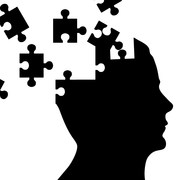Symptoms
They often begin mildly and progress over time. Symptoms vary according to the cause of the dementia, but often include:
-
Increasing trouble remembering things, such as:
- How to get to familiar locations
- What the names of family and friends are
- Where common objects are usually kept
- How to do simple math
- How to do usual tasks, such as cooking, dressing, bathing, etc.
- How to drive
- How to pay bills
- Having difficulty concentrating on tasks
- Having difficulty completing sentences due to lost/forgotten words (may progress to complete inability to speak)
- Forgetting the date, time of day, season
- Getting lost in familiar surroundings
- Having mood swings
- Being withdrawn, losing interest in usual activities
- Having personality changes
- Walking in a slow, shuffling way
- Having poor coordination
- Losing purposeful movement
Diagnosis
Doctors diagnose dementia by:
- Getting an extensive medical history from you and your family
- Closely observing you
- Doing a physical and neurological exam
- Doing mental status and psychological tests
There are no blood tests or exams that can definitively diagnose Alzheimer's disease. Certain types of brain imaging such as a SPECT or a PET scan may aid in a diagnosis. Tests to rule out other causes of dementia and other medical conditions that may mimic dementia include:
- Blood tests for syphilis , vitamin B12 , folate , thyroid, liver, and kidney function
- CT scan —a type of x-ray that uses a computer to make pictures of structures inside the head
- MRI scan —a test that uses magnetic waves to make pictures of structures inside the head
- PET or SPECT scans—tests that use dyes to measure the activity levels of various areas of the brain (used in some cases)
- Lumbar puncture —a test of the cerebrospinal fluid (CSF) from the lower back; may be done to look for infection or bleeding
- Electroencephalogram (EEG) —a test that records the brain's activity by measuring electrical signals from the brain
The doctor will also check to see if you have depression . It can often present like dementia.
Please be aware that this information is provided to supplement the care provided by your physician. It is neither intended nor implied to be a substitute for professional medical advice. CALL YOUR HEALTHCARE PROVIDER IMMEDIATELY IF YOU THINK YOU MAY HAVE A MEDICAL EMERGENCY. Always seek the advice of your physician or other qualified health provider prior to starting any new treatment or with any questions you may have regarding a medical condition. Copyright © 2024 EBSCO Publishing All rights reserved.
 Are Dementia and Alzheimer's Disease the Same?
Are Dementia and Alzheimer's Disease the Same?




